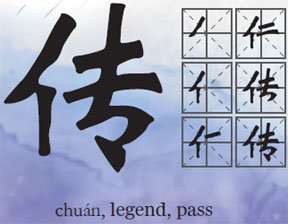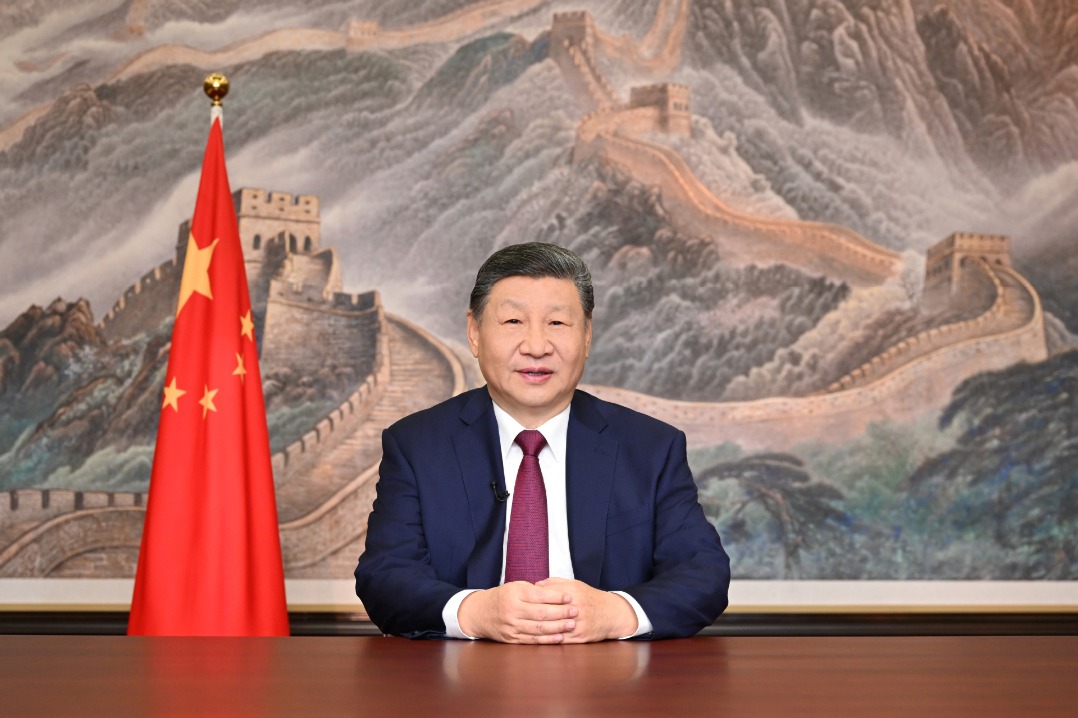Postman delivered a versatile expression

Rumors, legends, teamwork and writing can all be invoked with this character
Whether you're spreading rumors or legends, you need 傳。
It's said that a legend is simply a rumor with stamina. Faced with the mundane details of everyday life, people sometimes need to escape to a virtual, magical word for sweet respite. An imaginary universe, heroic characters, magic and exciting adventures - there's no limit to the wizardry of escapism.
In Chinese, the word for legend is 傳奇 (chuánqí), with 奇 (qí) meaning "strange, unusual, or extraordinary," but it's with the passage, or 傳 (chuán), of these legends that we shall concern ourselves.

The traditional version of 傳 is 傳, was originally a noun, pronounced as chuan, referring to postal carriages in ancient times. It is a pictophonetic character, with the "people" radical "亻" indicating the meaning, the postman, while 專(zhuān) serves as the pronunciation guide.
Gradually, this term was extended to serve as a verb, meaning to hand something from one person to another, or from one generation to the next. This leads to the term 祖?zhèn)髅胤?(zǔchuán mìfāng), a secret prescription handed down from an early ancestor of the family; or 傳經(jīng)送寶 (chuánjīng sòngbǎo), to pass on one's valuable experience. On a sports team, there is the term 傳幫帶 (chuán bāng dài), which consists of three one-character verbs: pass, help and lead, which refers to the tradition of veterans helping rookies. The idiom 傳宗接代 (chuánzōng jiēdài) means to have a son to carry on one's family name.
Passing or handing down information with the character 傳 can be broader; for this meaning, we have the word 傳播 (chuánbō, spread, publicize, disseminate). For example, 傳播謠言 (chuánbō yáoyán) is "to spread rumors," while rumor itself can be translated into 傳言 (chuányán). It is said that bad news has wings and Chinese has a similar proverb: "好事不出門(mén),壞事傳千里。(hàoshì bù chū mén, huàishì chuán qiānlǐ. Good news never goes beyond the gate; while bad news spreads far and wide.)"
傳 can also mean "express" or "convey". Language isn't the only way one might express oneself. Lovers convey their feelings through eye contact, which is called 眉目傳情 (méimù chuánqíng, flash amorous glances); vivid imagery in writing and painting can also express strong emotions, so it is called 傳神之筆 (chuánshén zhībǐ, pen that conveys spirit). If something is too subtle or profound to be conveyed, you can say 其中奧妙,不可言傳。(qízhōng àomiào, bù kě yánchuán. What lies within defies all description.)

In modern Chinese, we have the word 傳染 (chuánrǎn, infect, be contagious). It can be used for disease, as in, 她怕把病傳染給孩子。(Tā pà bǎ bìng chuánrǎn gěi háizi. She was afraid of giving the disease to her child.) Emotions, feelings and atmospheres are also contagious. You can say, 他的熱情傳染給了和他一起工作的每一個(gè)人。(Tā de rèqíng chuánrǎn gěi le tā yīqǐgōng zuò de měi yīgè rén. His enthusiasm infected everyone who worked with him.)"
As zhuan, this character is a noun with three meanings. The first meaning is "commentary on classics". For example, Confucian classics and the scholarly commentaries on them are called 經(jīng)傳 (jīngzhuàn). The second meaning refers to biographies, which, as part of ancient Chinese history texts, are called 列傳 (lièzhuàn); autobiography is 自傳 (zìzhuàn) and a profile or biographical sketch is called 小傳 (xiǎozhuàn). The last meaning is "novel or story
written in a historical style". One example is the book《水滸傳》 (shuǐ hǔ zhuàn), one of China's four great classics, translated as Outlaws of the Marsh.
Proverbs involving zhuan include 言歸正傳 (yán guī zhèng zhuàn), meaning "to come back to the story" or "return to the subject"; 樹(shù)碑立傳 (shù bēi lì zhuàn, to write a biography and build a monument for somebody) refers to actions that boost one's prestige and popularity, often used pejoratively. If you refer someone as 名不見(jiàn)經(jīng)傳 (míng bú jiàn jīngzhuàn), you mean that he or she is not a well-known figure, or more directly, is a nobody.
So, with a little help, you now know how to tell legends, encourage teammates, and write an autobiography - not bad for a little character about an ancient postal service.
Courtesy of The World of Chinese, www.theworldofchinese.com
The World of Chinese
(China Daily European Weekly 04/14/2017 page23)
Today's Top News
- Confidence, resolve mark China's New Year outlook: China Daily editorial
- Key quotes from President Xi's 2026 New Year Address
- Full text: Chinese President Xi Jinping's 2026 New Year message
- Poll findings indicate Taiwan people's 'strong dissatisfaction' with DPP authorities
- Xi emphasizes strong start for 15th Five-Year Plan period
- PLA drills a stern warning to 'Taiwan independence' separatist forces, external interference: spokesperson






























